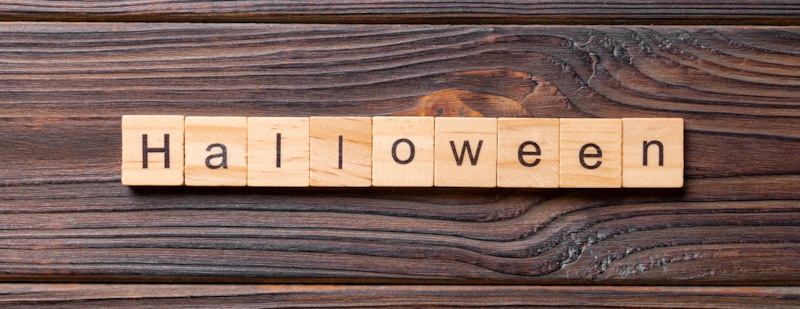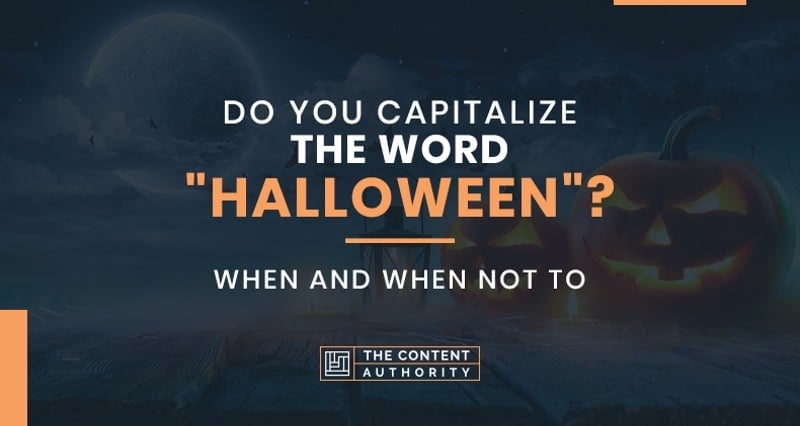There are two ways to “capitalize” on holidays. The first method is to invite your friends and family over and have loads of food and fun with them. The other way is to make sure you use the right letter case when writing down holiday names in your texts.
The word “Halloween” should be capitalized in writings since it’s a proper noun. Most word processors, in fact, auto-correct when you write the term in lowercase. This is not only with “Halloween”, all religious and secular holiday names (also religious seasons) are capitalized in writings.
Keep reading to learn the fascinating origins of Halloween or why the day is celebrated, the different rules of capitalization for holidays in general, and lots more.

What is Halloween? Why is it Celebrated?
Halloween is celebrated on October 31 every year, the festive evening before All Saints’ Day. Halloween has its origins in the Celtic calendar, wherein November 1 marks the first day of a calendar year.
The Halloween tradition has links with the Samhain, an ancient Celtic festival during which people lighted bonfires and dressed up in costumes that were believed to ward off evil spirits or ghosts.
The Celts lived two centuries ago in and around the regions currently known as the United Kingdom, Ireland, and northern France. They celebrated New Year’s on the 1st of November. The day signified the completion of summer or the harvest season and the beginning of winter for them.
The Celts and Their Spooky Beliefs
According to the Celts, the night prior to November 1 marked the period when the boundary between the dead and the living became blurred. On the night of October 31, the Celts celebrated the Samhain festival, believing that the dead returned to earth as ghosts on that night.
Besides damaging crops and causing trouble in general, the Celts thought the otherworldly spirits’ presence made predicting the future easier for Celtic priests, or the Druids. These prophecies offered the people comfort during the dark, long winter.
To commemorate the occasion, Druids erected massive sacred bonfires, where people amassed to burn animals and crops as sacrifices to their deities. The people, during the celebration, wore costumes invariably consisting of animal skins and heads.
See Also: Is Labor Day Capitalized?
All Saints’ Day
In the 8th century, Pope Gregory III chose November 1 as the day to honor or pay tribute to all saints. The day was called All Saints’ Day or All Hallows’ Day.
All Saints’ Day borrowed some of the Samhain traditions. The evening prior to it was called All Hallows’ Even (or Eve). With time, Halloween turned into a day when activities such as festive gatherings, carving jack-o-lanterns, eating treats, and donning weird costumes became customary.
The Story Behind the Spelling of “Halloween”
The name “Halloween” is derived from the phrase “All Hallows’ Even”, which denotes the evening prior to All Hallows’ Day (November 1).
The portions “all” and “s” from the phrase were dropped after some time – with “hallows’ ” and “even” becoming a closed compound. The letter “s” with the apostrophe got replaced by the letter “v”, resulting in “Hallowe’en”. With time, the word underwent multiple transitions and eventually became “Halloween”.
If you want to give your Halloween party a classic or 18th-century feel, you may use the spelling “Hallowe’en” instead of “Halloween” in your invites and party decorations. Both “Hallowe’en” and “Halloween” are dictionary-approved words that mean the same thing. Outside of the United States, the spelling with the apostrophe is a lot more common.
Capitalizing the Word “Halloween”
As mentioned above, the word “Halloween” should be capitalized. It should be capitalized if it’s used in a sentence or is part of a heading or title. Even if the words accompanying it are written in lowercase, “Halloween” should always be capitalized.
Capitalizing the Term “Night” After Halloween?
The term “Halloween” is a proper noun or name of a holiday and it’s, therefore, capitalized. The word “night” (which usually follows it right after in sentences), however, should not be capitalized as it’s not a proper noun or part of the holiday’s name.
If the phrase “Halloween night” is used in a title, the word “night” in it can be capitalized. Also, if the phrase denotes a name of an event or a movie, you may capitalize it, as in “Halloween Night”.
Different Holiday Names and Capitalization Rules
As mentioned earlier, all holiday names are typically capitalized. This includes holidays on which schools and businesses are closed. Church holidays that aren’t recognized by governments are also capitalized.
Holidays such as Thanksgiving, Christmas, New Year’s Day, Boxing Day, Ramadan, etc. are all capitalized. Religious seasons, such as Lent and Advent, also get the capitalization treatment. However, non-religious season names are not capitalized – including winter, summer, spring, and fall.
Almost all religious holiday names that end with “eve” and “day” are capitalized. And this rule applies even if the name of the holiday is truncated – for instance, New Year’s or Xmas. Some of the other holidays that are capitalized in writings include:
- Good Friday
- Father’s Day
- Easter
- Kwanzaa (an Afro-American festival)
- Maundy Thursday
- Memorial Day
- May Day
- Mother’s Day
- New Year’s Eve
- Yom Kippur
Here are a few sentences with the above holiday names:
- Good Friday comes before Easter.
- What my husband would fancy the most is to stay in his bed throughout Father’s Day.
- Kwanzaa celebrations are usually private, observed by families, individuals, and local communities.
- The sacred oil gets blessed in the church on Maundy Thursday.
- May Day celebrations are usually muted when compared to New Year’s or Christmas.
Holiday or Personal Greetings are Not Capitalized

Though holiday names are capitalized, greetings and salutations are not capitalized. For example, “season’s greetings”, “happy anniversary”, “happy birthday“, etc. are not capitalized. Here are a few example sentences:
- We wish you a very happy birthday!
- The large Christian community of the country received season’s greetings from the Muslim king.
If the phrase, however, comes at the beginning of the sentence or is part of a title or headline, it is capitalized. For example:
- Happy birthday! We wish all your dreams come true.
- Season’s greetings, from all of us here at Lexus Law Firm.
- Happy Birthday
- Merry Christmas
The phrase “… merry Christmas…” in a sentence might look odd, but lowercase “merry” is indeed grammatically correct.
If the phrases of greetings are used with the name of a holiday, the holiday name will stay capitalized. For example:
- The manager ended the program by wishing everybody a happy New Year.
In the above sentence, the term “New Year” is a proper noun and, therefore, capitalized. The word “happy”, however, is an adjective and is, therefore, not capitalized when used with the noun “New Year” in a sentence.
Example Sentences with the Word “Halloween”
Here is a list of example sentences with the word “Halloween”:
- I wish your family and friends a “spooktacular” Halloween.
- Going to a Halloween party without dressing up for it is almost sacrilegious.
- The sales could pick up during this Halloween season.
- The series of events reminded her of the Halloween night two years ago.
- Elizabeth briefed Sarah about the Halloween party she was planning to throw next week and wanted to know if she could lend a helping hand.
- He had zero emotions, like a guy wearing a Halloween mask.
- Dressing up for Halloween is all about trying hair and dressing styles that you normally won’t consider donning.
- Hats and masks are synonymous with Halloween.
- Halloween makeup images will help you find some inspiration for your costume.
- Makeup helps add finishing touches to any Halloween costume.
- Applying Halloween makeup is not as easy as it might sound.
- Halloween cake toppers help spruce up confections that otherwise do not have any special decorations.
- After Halloween is done, you may want to consider how to get rid of your zombie makeup.
- Either buy this scary Halloween costume or design your own outfit using it as inspiration.
- Generally, a greater number of costume stores crop up around Halloween.
- The dresses worn on Halloween are usually so outlandish that the day can also be celebrated as “world costume day”.
- Couples have a lot more Halloween costume options than they’d like to believe.
- Spooky costume designs are an integral part of Halloween celebrations.
- Face painting skills come in extremely handy during Halloween and similar occasions.
Conclusion

Halloween is not your conventional holiday and finding the right words and phrases to wish your near and dear ones a happy Halloween could be tricky. Most people resort to quotes, jokes, sayings, etc. in their greetings to get the message across. Irrespective of what word(s) you choose to wish others a great Halloween, just do not write the holiday name in lowercase.
If you are sending a handmade card with the title “Happy Halloween”, you perhaps don’t need to be reminded of the capitalization rule. But if you are using the phrase in a sentence and the adjective “happy” is in lowercase, you might end up writing “Halloween” in lowercase too. Just be wary enough to not make that grammar blunder.
Shawn Manaher is the founder and CEO of The Content Authority. He’s one part content manager, one part writing ninja organizer, and two parts leader of top content creators. You don’t even want to know what he calls pancakes.

